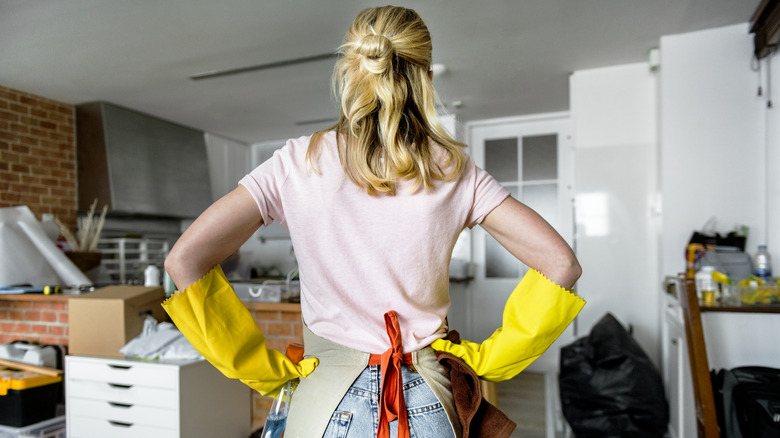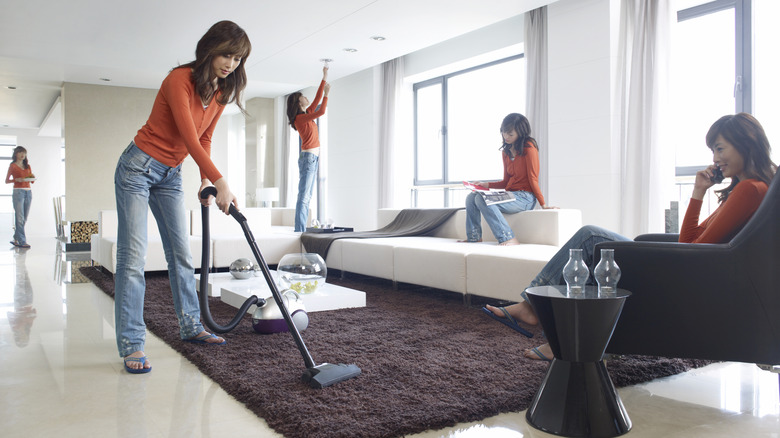Women Who Out-Earn Their Husbands Have More Household Chores And Yes, That Should Piss You Off
What do we want? An equal division of household chores! When do we want it? Now! The year is 2023, and many wives are out-earning or at the least rivaling their husbands' salaries. (Sorry, not sorry.) This is where "egalitarian marriage" comes into play. According to the Pew Research Center, an egalitarian marriage is one wherein the incomes are about the same. Alas, there's one tiny little problem.
As it turns out, when it comes to household chores in an egalitarian marriage, often, the dynamic is anything but equal. Studies show that wives are still doing chores at home too. "We've been conditioned to value [women's time] less than men's time. And we, as a society, we protect men's time — and that was something that I was finding over and over again as I was interviewing people," Eve Rodsky, author of "Fair Play: A Game-Changing Solution for When You Have Too Much to Do," told the Washington Post. In her book, Rodksy proposes an all-new way for couples to navigate household chores and responsibilities in a more equitable way. Sadly, however, society is still far from catching on to Rodksy's "Fair Play" system. But don't just take our word for it.
Egalitarian marriages aren't exactly equal
While the Pew Research Center study found that 29% of marriages were deemed egalitarian, the study also concluded that even in those marriages, females spent more time on household chores and domestic tasks (4.6 hours a week). In contrast, their male counterparts spent less time completing household duties (1.9 hours a week) and more time engaging in leisure activities and hobbies (25.2 hours a week), whereas women spent 21.6 hours a week on leisure activities.
When you throw kids into the equation, the disparity becomes even greater. It's reported that women spent a whopping 5.1 hours doing housework and 12.2 hours caregiving each week, while men spent 2.2 hours doing housework and 9 hours a week acting as caregivers. "I think a big reason is simply that men are happy for their partner to bring home another paycheck, but aren't as happy to do more chores," The New York Times correspondent Claire Cain Miller opined. But what does all of this mean, exactly?
Women are tired
Women are tired, y'all. The story goes that Eve Rodksy was doing kid pickup duty while her breast pump rode in the passenger seat and a client contract sat splayed in her lap. That's when her husband sent her a text message that read, "I'm surprised you didn't get blueberries." It was at that exact moment that she realized she had finally had enough. "I pulled over and started thinking to myself, well, if my marriage is going to end, it should be over an affair with an NFL player. It just felt so cliché that I was crying over blueberries," she told Chief, a private membership network for women. "More importantly, I was thinking about how I became the default — or 'shefault' — for literally every single domestic task in my family besides mowing the lawn ... I'm a mediator and a lawyer. I'm literally trained to use my voice," she noted.
Unfortunately, this line of thinking among women is not uncommon. "It is not surprising that women who value more equity in the division of labor but do not have support from their partners are less satisfied," researcher Brian Ogolsky told Greater Good Magazine. "Essentially, these women are valuing equity but getting less than what they bargained for." But speaking of antiquated gender roles ...
Same-sex spouses might have it figured out
Do same-sex spouses have it all figured out? Maybe. According to Kenneth Matos, senior director of research at the Families and Work Institute, same-sex spouses "use a lot of mixing and matching" to divide and conquer domestic tasks and caregiving responsibilities (via NBC News). "It's not a masculine or a feminine thing; it is just what we do to function as a couple and have our family work," Jared Hunt told The New York Times about his and his husband's decision to split up household chores according to their strengths and weaknesses. Hunt takes care of the laundry while his husband, Dorian Kendal, cooks. "Jared should not ever cook," Kendal joked.
Still, some experts argue that even same-sex couples also risk falling into the same trap of one person bearing the brunt of the household work. "The egalitarian utopia is overly simplified because that is not people's reality," psychology professor Abbie Goldberg said. "The truth is, same-sex couples wrestle with the same dynamics as heterosexuals. Things are humming along and then you have a baby or adopt a child, and all of a sudden, there's an uncountable amount of work." Here's to hoping society can let go of those old-fashioned dynamics once and for all!



